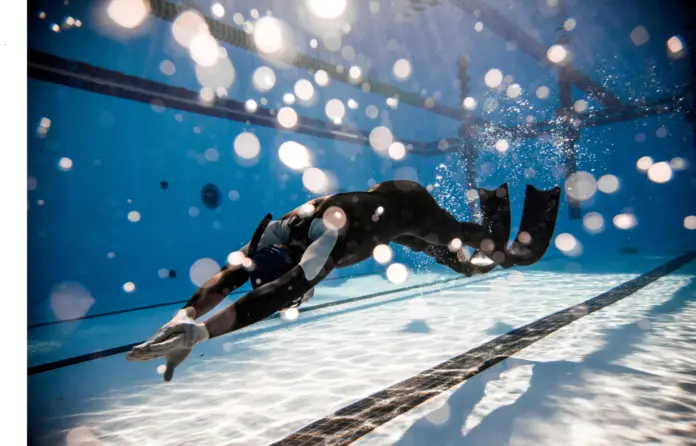There are many freedivers who do not have access to depth, therefore most of their training is conducted dry or in the pool. Since it is easier to find a pool for a competition than a deep enough body of water, pool competitions are more common and easier for athletes of all levels to compete in and train for. With these competitions come several mistakes made by athletes, which results in a disqualifying red or penalizing yellow card rather than a white card for a clean dive. Check out some common mistakes athletes make in pool competitions and keep them in mind if the time comes for you to compete.
Surface Protocol Mistakes
There are 5 common surface protocol (SP) mistakes that result in a red card for failure to complete surface protocol (DQSP). We touched on them in last week’s article, read over them to familiarize yourself with how important SP is to your dive.
Making Surface Protocol (SP) To Your Coach
If you are used to training with the same coach over and over again, you may develop a habit where you look at them during your recovery breaths and SP. Unfortunately, SP has to be performed to the judges, or at least in their general direction. Depending on the judge, if you are angled away from them and they or the cameras cannot see your face clearly, they may give you a red card, since in the rules it states to give the OK sign “to the judge.” It might be helpful to have your coach give you directions upon surfacing, such as “look at the judge,” “remove your mask,” “give an OK sign,” etc, which is allowed.
Early Start
It can be hard to time your final breath with the official top (the start time when an athlete needs to begin a competition performance), and you may take your last breath too quickly and worry that you are going to waste precious oxygen before even performing. As soon as your airways touch the water, whether it is submerging your face or removing your snorkel before the official top is called, you will receive a yellow card for an early start and 1 point deducted for every unit of 5 seconds before the official top.
Late Start
This is more common for athletes that are used to depth competitions and the separate rules regarding timing. In depth, the athlete is allowed to begin the dive up to 30 seconds after official top without incurring any penalties. In pool competitions, you only have 10 seconds after the official top is called to submerge your airways and begin your performance. Any later than 10 seconds, you will be given a yellow card for a late start, and you will be deducted 1 point per unit of 5 seconds. If you have not begun the performance 30 seconds after the official top has been called, you will be disqualified and not allowed to start.
Timing
While this is not a disqualifier and you will be given no penalties, some athletes who are not closely paying attention to time may arrive in their lane too close to their official top. The problem with this is that you may not have enough time for the breathe up, especially if you arrive late and are also putting on and adjusting equipment. Arrive as soon as you are allowed to, have all of your equipment ready, and give yourself enough time to lower your heart rate and completely relax.
Extended Warm-Ups or Long Warm-Up
Everyone has different ways of warming-up before their official performance, but it has been noted that some athletes may warm-up too much and too strenuously, thereby exhausting themselves, causing them to underperform or even blackouts. Some may even have a long warm-up before their official top, but the surface interval is not enough for them to recover properly and relax before their performance dive, which can also result in underperforming or blacking out.
Just relax and have fun
Competitions can be stressful and scary to experience at first, but they do not have to be. Going from personal training to having to follow a rigid set of rules can be confusing, which is why it is recommended to compete in a competition just for fun for your first time, so that you can understand the rules and feel less pressure. The most important thing to remember is to know your limits and stay within them. There is never a need to push yourself so far that you have a blackout or injure yourself. Just remember these common mistakes, relax, and have fun at your next competition!

